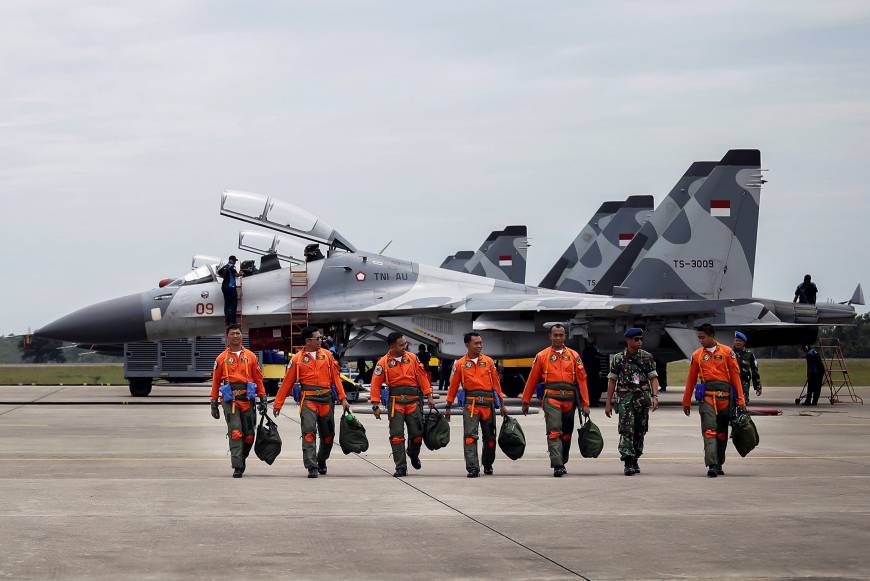India and Indonesia push back against China with a military alliance
By David Lipson
As China's growing influence dominates headlines, India and Indonesia have joined Australia in pushing back.
The two countries signed an agreement for closer military ties, and while it was not mentioned specifically in the official communique, concerns over China's military expansion in the South China Sea are clearly at the heart of the deal.
Australia has welcomed the agreement, suggesting it will work closely with India and Indonesia to ensure international law is maintained in the region.
India's Prime Minister Narendra Modi's visit to Jakarta was a clear display of friendship between the two countries.
That friendship extends beyond trade and tourism, with their military ties elevated to a "comprehensive strategic partnership".
Indonesian President Joko Widodo said the visit was timely in the midst of many uncertainties in the world.
"I hope the partnership will contribute to stability, peace and prosperity," he said.
 President Joko Widodo said Narendra Modi's visit was timely in the midst of many uncertainties in the world.
President Joko Widodo said Narendra Modi's visit was timely in the midst of many uncertainties in the world.
A communique released by India's Government spoke of the importance of a rules-based Indo Pacific region — where international law, freedom of navigation and overflight are respected.
In other words, India and Indonesia are pushing back against China's growing dominance in the region.
Professor Rory Medcalf, head of the National Security College at ANU, said it was a "very serious development in regional security".
"We're seeing two key middle powers joining forces to offer an alternative to Chinese hegemony, or indeed to an uncertain American leadership," he said.
China has been taking an increasingly assertive role in the South China Sea.
Two weeks ago it landed several H-6K long range bombers on an airstrip in the disputed region — placing all of South-East Asia within range.
 India's Prime Minister Narendra Modi's visit to Jakarta was a clear display of friendship between the two countries.
India's Prime Minister Narendra Modi's visit to Jakarta was a clear display of friendship between the two countries.
This year the US pushed back by dispatching warships to conduct freedom of navigation exercises through disputed sea lanes.
And in an indication America plans to continue its pressure, new language has been officially adopted by the US military.
"US Pacific command has this week changed its name, it will be called Indo Pacific command," Professor Medcalf said.
This, he said, reflected the fact that the US remained "strategically engaged with the wider Indo Pacific region".
That friendship extends beyond trade and tourism, with their military ties elevated to a "comprehensive strategic partnership".
Indonesian President Joko Widodo said the visit was timely in the midst of many uncertainties in the world.
"I hope the partnership will contribute to stability, peace and prosperity," he said.
 President Joko Widodo said Narendra Modi's visit was timely in the midst of many uncertainties in the world.
President Joko Widodo said Narendra Modi's visit was timely in the midst of many uncertainties in the world.A communique released by India's Government spoke of the importance of a rules-based Indo Pacific region — where international law, freedom of navigation and overflight are respected.
In other words, India and Indonesia are pushing back against China's growing dominance in the region.
Professor Rory Medcalf, head of the National Security College at ANU, said it was a "very serious development in regional security".
"We're seeing two key middle powers joining forces to offer an alternative to Chinese hegemony, or indeed to an uncertain American leadership," he said.
China has been taking an increasingly assertive role in the South China Sea.
Two weeks ago it landed several H-6K long range bombers on an airstrip in the disputed region — placing all of South-East Asia within range.
 India's Prime Minister Narendra Modi's visit to Jakarta was a clear display of friendship between the two countries.
India's Prime Minister Narendra Modi's visit to Jakarta was a clear display of friendship between the two countries. This year the US pushed back by dispatching warships to conduct freedom of navigation exercises through disputed sea lanes.
And in an indication America plans to continue its pressure, new language has been officially adopted by the US military.
"US Pacific command has this week changed its name, it will be called Indo Pacific command," Professor Medcalf said.
This, he said, reflected the fact that the US remained "strategically engaged with the wider Indo Pacific region".
So where does this leave Australia?
In a statement to the ABC, Foreign Minister Julie Bishop said the Government welcomed the India-Indonesia partnership.
"Our three countries share a commitment to a free, open, rules-based, peaceful and prosperous region," she said.
"This includes respect for international law.
"Australia is working closely with India and Indonesia to advance these objectives."
Professor Medcalf said it showed that the idea of the Indo Pacific was "not simply some American plot as some pro-China voices have claimed."
"This development shows that Indonesia and India are beginning creatively to use their geography to position themselves at the core of new regional structures that Australia can link with, that Australia can play into," he said.
"That I think in many ways will moderate and balance Chinese power — this game is far from over."
Aucun commentaire:
Enregistrer un commentaire